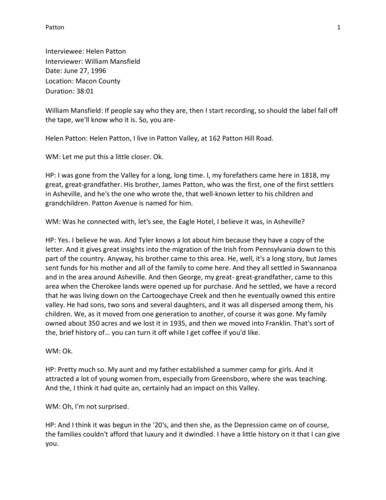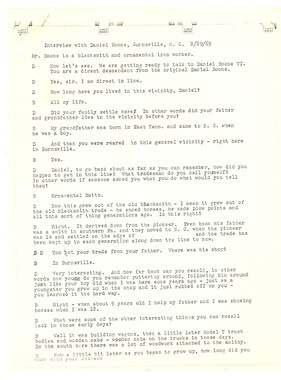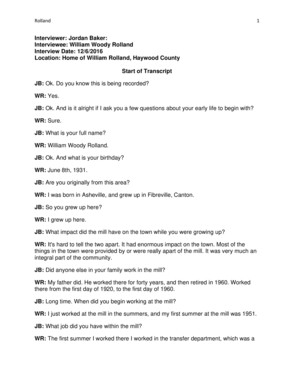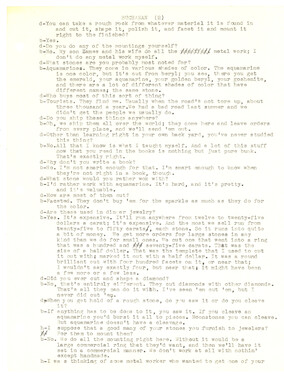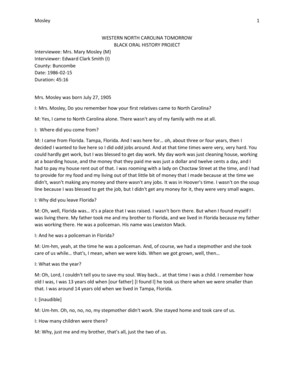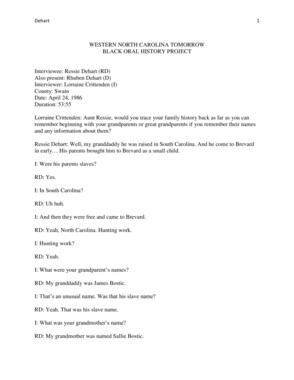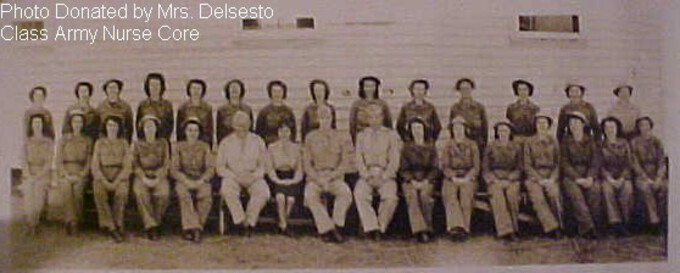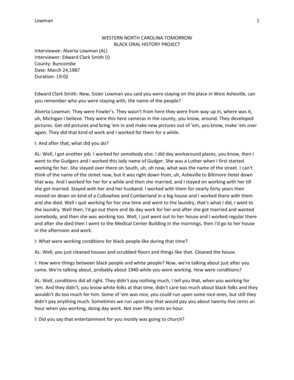Western Carolina University (20)
View all
- Canton Champion Fibre Company (2308)
- Cherokee Traditions (293)
- Civil War in Southern Appalachia (165)
- Craft Revival (1942)
- Great Smoky Mountains - A Park for America (2683)
- Highlights from Western Carolina University (430)
- Horace Kephart (941)
- Journeys Through Jackson (154)
- LGBTQIA+ Archive of Jackson County (15)
- Oral Histories of Western North Carolina (314)
- Picturing Appalachia (6679)
- Stories of Mountain Folk (413)
- Travel Western North Carolina (160)
- Western Carolina University Fine Art Museum Vitreograph Collection (129)
- Western Carolina University Herbarium (92)
- Western Carolina University: Making Memories (708)
- Western Carolina University Publications (2283)
- Western Carolina University Restricted Electronic Theses and Dissertations (146)
- Western North Carolina Regional Maps (71)
- World War II in Southern Appalachia (131)
University of North Carolina Asheville (6)
View all
- Allanstand Cottage Industries (62)
- Appalachian National Park Association (53)
- Bennett, Kelly, 1890-1974 (1295)
- Berry, Walter (76)
- Brasstown Carvers (40)
- Carver, George Washington, 1864?-1943 (26)
- Cathey, Joseph, 1803-1874 (1)
- Champion Fibre Company (233)
- Champion Paper and Fibre Company (297)
- Cherokee Indian Fair Association (16)
- Cherokee Language Program (22)
- Crowe, Amanda (40)
- Edmonston, Thomas Benton, 1842-1907 (7)
- Ensley, A. L. (Abraham Lincoln), 1865-1948 (275)
- Fromer, Irving Rhodes, 1913-1994 (70)
- George Butz (BFS 1907) (46)
- Goodrich, Frances Louisa (120)
- Grant, George Alexander, 1891-1964 (96)
- Heard, Marian Gladys (60)
- Kephart, Calvin, 1883-1969 (15)
- Kephart, Horace, 1862-1931 (313)
- Kephart, Laura, 1862-1954 (39)
- Laney, Gideon Thomas, 1889-1976 (439)
- Masa, George, 1881-1933 (61)
- McElhinney, William Julian, 1896-1953 (44)
- Niggli, Josephina, 1910-1983 (10)
- North Carolina Park Commission (105)
- Osborne, Kezia Stradley (9)
- Owens, Samuel Robert, 1918-1995 (11)
- Penland Weavers and Potters (36)
- Roberts, Vivienne (15)
- Roth, Albert, 1890-1974 (142)
- Schenck, Carl Alwin, 1868-1955 (1)
- Sherrill's Photography Studio (2565)
- Southern Highland Handicraft Guild (127)
- Southern Highlanders, Inc. (71)
- Stalcup, Jesse Bryson (46)
- Stearns, I. K. (213)
- Thompson, James Edward, 1880-1976 (226)
- United States. Indian Arts and Crafts Board (130)
- USFS (683)
- Vance, Zebulon Baird, 1830-1894 (1)
- Weaver, Zebulon, 1872-1948 (58)
- Western Carolina College (230)
- Western Carolina Teachers College (282)
- Western Carolina University (1794)
- Western Carolina University. Mountain Heritage Center (18)
- Whitman, Walt, 1819-1892 (10)
- Wilburn, Hiram Coleman, 1880-1967 (73)
- Williams, Isadora (3)
- Cain, Doreyl Ammons (0)
- Crittenden, Lorraine (0)
- Rhodes, Judy (0)
- Smith, Edward Clark (0)
- Appalachian Region, Southern (2393)
- Asheville (N.C.) (1886)
- Avery County (N.C.) (26)
- Blount County (Tenn.) (147)
- Buncombe County (N.C.) (1664)
- Cherokee County (N.C.) (283)
- Clay County (N.C.) (555)
- Graham County (N.C.) (233)
- Great Smoky Mountains National Park (N.C. and Tenn.) (478)
- Haywood County (N.C.) (3522)
- Henderson County (N.C.) (70)
- Jackson County (N.C.) (4692)
- Knox County (Tenn.) (21)
- Knoxville (Tenn.) (9)
- Lake Santeetlah (N.C.) (10)
- Macon County (N.C.) (420)
- Madison County (N.C.) (211)
- McDowell County (N.C.) (39)
- Mitchell County (N.C.) (132)
- Polk County (N.C.) (35)
- Qualla Boundary (981)
- Rutherford County (N.C.) (76)
- Swain County (N.C.) (2017)
- Transylvania County (N.C.) (247)
- Watauga County (N.C.) (12)
- Waynesville (N.C.) (68)
- Yancey County (N.C.) (72)
- Aerial Photographs (3)
- Aerial Views (60)
- Albums (books) (4)
- Articles (1)
- Artifacts (object Genre) (228)
- Biography (general Genre) (2)
- Cards (information Artifacts) (38)
- Clippings (information Artifacts) (191)
- Crafts (art Genres) (622)
- Depictions (visual Works) (21)
- Design Drawings (1)
- Drawings (visual Works) (184)
- Envelopes (73)
- Facsimiles (reproductions) (1)
- Fiction (general Genre) (4)
- Financial Records (12)
- Fliers (printed Matter) (67)
- Glass Plate Negatives (381)
- Guidebooks (2)
- Internegatives (10)
- Interviews (811)
- Land Surveys (102)
- Letters (correspondence) (1013)
- Manuscripts (documents) (619)
- Maps (documents) (159)
- Memorandums (25)
- Minutes (administrative Records) (59)
- Negatives (photographs) (5651)
- Newsletters (1285)
- Newspapers (2)
- Occupation Currency (1)
- Paintings (visual Works) (1)
- Pen And Ink Drawings (1)
- Periodicals (193)
- Personal Narratives (7)
- Photographs (12982)
- Plans (maps) (1)
- Poetry (5)
- Portraits (1654)
- Postcards (329)
- Programs (documents) (151)
- Publications (documents) (2237)
- Questionnaires (65)
- Scrapbooks (282)
- Sheet Music (1)
- Slides (photographs) (402)
- Sound Recordings (796)
- Specimens (92)
- Speeches (documents) (15)
- Tintypes (photographs) (8)
- Transcripts (322)
- Video Recordings (physical Artifacts) (23)
- Vitreographs (129)
- Text Messages (0)
- A.L. Ensley Collection (275)
- Appalachian Industrial School Records (7)
- Appalachian National Park Association Records (336)
- Axley-Meroney Collection (2)
- Bayard Wootten Photograph Collection (20)
- Bethel Rural Community Organization Collection (7)
- Blumer Collection (5)
- C.W. Slagle Collection (20)
- Canton Area Historical Museum (2110)
- Carlos C. Campbell Collection (198)
- Cataloochee History Project (65)
- Cherokee Studies Collection (4)
- Daisy Dame Photograph Album (5)
- Daniel Boone VI Collection (1)
- Doris Ulmann Photograph Collection (112)
- Elizabeth H. Lasley Collection (1)
- Elizabeth Woolworth Szold Fleharty Collection (4)
- Frank Fry Collection (95)
- George Masa Collection (173)
- Gideon Laney Collection (452)
- Hazel Scarborough Collection (2)
- Hiram C. Wilburn Papers (28)
- Historic Photographs Collection (236)
- Horace Kephart Collection (861)
- Humbard Collection (33)
- Hunter and Weaver Families Collection (1)
- I. D. Blumenthal Collection (4)
- Isadora Williams Collection (4)
- Jesse Bryson Stalcup Collection (47)
- Jim Thompson Collection (224)
- John B. Battle Collection (7)
- John C. Campbell Folk School Records (80)
- John Parris Collection (6)
- Judaculla Rock project (2)
- Kelly Bennett Collection (1314)
- Love Family Papers (11)
- Major Wiley Parris Civil War Letters (3)
- Map Collection (12)
- McFee-Misemer Civil War Letters (34)
- Mountain Heritage Center Collection (4)
- Norburn - Robertson - Thomson Families Collection (44)
- Pauline Hood Collection (7)
- Pre-Guild Collection (2)
- Qualla Arts and Crafts Mutual Collection (12)
- R.A. Romanes Collection (681)
- Rosser H. Taylor Collection (1)
- Samuel Robert Owens Collection (94)
- Sara Madison Collection (144)
- Sherrill Studio Photo Collection (2558)
- Smoky Mountains Hiking Club Collection (616)
- Stories of Mountain Folk - Radio Programs (374)
- The Reporter, Western Carolina University (510)
- Venoy and Elizabeth Reed Collection (16)
- WCU Gender and Sexuality Oral History Project (32)
- WCU Mountain Heritage Center Oral Histories (25)
- WCU Oral History Collection - Mountain People, Mountain Lives (71)
- WCU Students Newspapers Collection (1744)
- Western North Carolina Tomorrow Black Oral History Project (69)
- William Williams Stringfield Collection (2)
- Zebulon Weaver Collection (109)
- African Americans (388)
- Appalachian Trail (32)
- Artisans (521)
- Cherokee art (84)
- Cherokee artists -- North Carolina (10)
- Cherokee language (21)
- Cherokee pottery (101)
- Cherokee women (208)
- Church buildings (166)
- Civilian Conservation Corps (U.S.) (110)
- College student newspapers and periodicals (1830)
- Dams (94)
- Dance (1023)
- Education (222)
- Floods (60)
- Folk music (1015)
- Forced removal, 1813-1903 (2)
- Forest conservation (220)
- Forests and forestry (905)
- Gender nonconformity (4)
- Great Smoky Mountains National Park (N.C. and Tenn.) (154)
- Hunting (38)
- Landscape photography (10)
- Logging (103)
- Maps (84)
- Mines and mineral resources (8)
- North Carolina -- Maps (18)
- Paper industry (38)
- Postcards (255)
- Pottery (135)
- Railroad trains (69)
- Rural electrification -- North Carolina, Western (3)
- School integration -- Southern States (2)
- Segregation -- North Carolina, Western (5)
- Slavery (5)
- Sports (452)
- Storytelling (245)
- Waterfalls -- Great Smoky Mountains (N.C. and Tenn.) (66)
- Weaving -- Appalachian Region, Southern (280)
- Wood-carving -- Appalachian Region, Southern (328)
- World War, 1939-1945 (173)
Interview with Helen Patton
Item
Item’s are ‘child’ level descriptions to ‘parent’ objects, (e.g. one page of a whole book).
-
-
Patton 1 Interviewee: Helen Patton Interviewer: William Mansfield Date: June 27, 1996 Location: Macon County Duration: 38:01 William Mansfield: If people say who they are, then I start recording, so should the label fall off the tape, we'll know who it is. So, you are- Helen Patton: Helen Patton, I live in Patton Valley, at 162 Patton Hill Road. WM: Let me put this a little closer. Ok. HP: I was gone from the Valley for a long, long time. I, my forefathers came here in 1818, my great, great-grandfather. His brother, James Patton, who was the first, one of the first settlers in Asheville, and he's the one who wrote the, that well-known letter to his children and grandchildren. Patton Avenue is named for him. WM: Was he connected with, let's see, the Eagle Hotel, I believe it was, in Asheville? HP: Yes. I believe he was. And Tyler knows a lot about him because they have a copy of the letter. And it gives great insights into the migration of the Irish from Pennsylvania down to this part of the country. Anyway, his brother came to this area. He, well, it's a long story, but James sent funds for his mother and all of the family to come here. And they all settled in Swannanoa and in the area around Asheville. And then George, my great- great-grandfather, came to this area when the Cherokee lands were opened up for purchase. And he settled, we have a record that he was living down on the Cartoogechaye Creek and then he eventually owned this entire valley. He had sons, two sons and several daughters, and it was all dispersed among them, his children. We, as it moved from one generation to another, of course it was gone. My family owned about 350 acres and we lost it in 1935, and then we moved into Franklin. That's sort of the, brief history of… you can turn it off while I get coffee if you'd like. WM: Ok. HP: Pretty much so. My aunt and my father established a summer camp for girls. And it attracted a lot of young women from, especially from Greensboro, where she was teaching. And the, I think it had quite an, certainly had an impact on this Valley. WM: Oh, I'm not surprised. HP: And I think it was begun in the '20's, and then she, as the Depression came on of course, the families couldn't afford that luxury and it dwindled. I have a little history on it that I can give you. Patton 2 WM: Oh, I'd be really interested in that. Now they established a camp for girls, did, do you remember the name of the camp? HP: Of course. It was Camp Taukeetah. T-a-u-k-e-e-t-a-h. It was a Cherokee Indian name, Taukeetah was apparently, I don't know, I think it was an eagle or took the ladies and snatched them up. I don't know, remember the whole story, but there were cabins for girls, and it was very rustic. But every, each cabin was named, had a Cherokee name, Nikwasi and, I don't know, remember all of them. But she acquainted the girls with the Cherokees, and she and the Cherokee Indians come over and play their ball game on the, on our lawn, and did a lot of really interesting things. There were two summer camps in Franklin. One was down where the present Franklin Golf Course is, and that, and the lodge at that camp I think still stands, that was Camp, was it Nikwasi, I'm not sure. But it was Camp- WM: Camp Ni- HP: N-i-k-w-a-s-i. It was established by Miss Laura Jones, who was also a teacher. WM: Was that a girl's camp too, or for, I think, summer camps are definitely related to the tourist industry cause they're people who come in the summer and it affects the regions, so I'd be real interested to know more about that. HP: Yes. A lot of people came up here to visit the campers. I think they came by train to Asheville, maybe even to Sylva, I'm not sure. The girls, and then they were met. WM: Well, I talked to a man in Asheville who worked for the Southern Railroad, he said that he used to take the train from Asheville down to somewhere in central Georgia, and bring up hundreds of campers for the different camps you know, south and east of Asheville, and south and west of Asheville too. HP: Franklin has been a center for tourism for many, many years. It goes back to the 1890's, I mean the late 1800's. People came up from Georgia, and spent the summer rocking on the porches of the inns. There was one, the Franklin Terrace, which is still standing, and is now a bed and breakfast, and there was another one, the Lyall's, it was Tremont Inn. Quite a large enterprise. And there were a lot of people who came here who were very cultured individuals who introduced music and art and other things. Contrary to what a lot of people think, the mountain people in this area were not uneducated hillbillies. At one time, it was said that Macon county had the highest number of college graduates of any county, or maybe it was Franklin, any town of similar proportions in the United States, and I think that was true. Tourism certainly affected the early days in this county. WM: Well the notion of the uneducated hillbilly is usually a product of somebody who is not from the region and has no idea of what really goes on in this part of the country. Patton 3 HP: Well, the uneducated hillbilly is the individual who is most written about. I think it's more picturesque. They're more picturesque than ordinary people. WM: Well, also it creates an 'other'. You define yourself by what you're not, so you point to someone who is less educated, less cultured than yourself, and that builds your, builds you up, so that's one reason why that image was perpetuated, so I've read. But do you, let's see, you said you've lived here for awhile and then you went away. When did you leave this region? HP: Well, to begin with, in 1931 I graduated from high school. And I went to Western Carolina Teacher's College, two years. And then because of family circumstances I came back and taught for a couple of years, and then I went to Peabody College for a bachelor's degree and following that, I was teaching art in Durham and the art teacher at Western resigned and she asked me to come and teach during the summer, so I did. Then I coaxed President Hunter into giving me a job there. And he did with the understanding that I had to get my Master's as soon as possible. And I went to the University of Chicago, did my Master's. Then I was in the Midwest for 40 years or so. WM: Did you say 4 or 40? HP: 40. WM: Ok. HP: I lived in Illinois and Iowa and Wisconsin, and then when I, I never thought of coming back here. I left, actually I left in '36. I didn't, that's when we lost the, our property. Lost our home. I didn't really want to come back without it. And I didn't actually. Maybe once or twice, but so that's when I actually left. And we lived in Franklin then. Then the war came and I had 5 brothers in the service. Well, after I moved to Illinois, from the University of Chicago, our whole family was separated primarily because of the war. We didn't get together too often. But then when I decided to retire, after long deliberation, I bought this hill and built my house, and walked out of my office. The house was built while I was in Wisconsin, and walked out of my office and I've been here since. WM: I've never, I've ridden the train through Chicago and that's about, that, most I can tell you about. HP: It's a great city. I, then I was in Racine, Wisconsin, which is just north of Chicago, for 30 odd years. Close enough that I could take large groups to the Art Institute and go to the opera, and all the rest. I loved Chicago. WM: Well, so anyhow. HP: Let's get back to tourism. Patton 4 WM: Yea. I was gonna say, that's what I'm here to talk with you about. And you said it had a big impact on the community and it brought music and art into the region. But what do you remember, your earliest memories about tourists? I mean, did you hear your parents commenting on 'em, or? HP: Well, my grandfather had a fishing camp on the Nantahala River over between here and Hayesville. And he, I can remember that, people came from all over to his fishing camp. And he was a great host. He was a man who was well-read, and he enjoyed his guests. And I remember there was a camp, it was Silver Birch Lodge, which is over in the Nantahala too. And a lot of tourists came there. They came fishing. Then when, I can remember Franklin was affected, the drugstore in Franklin was, I mean one of my first memories of that is the fact that my mother painted fungi and sold them in that drugstore. And of course, that had an interest to me because tourists bought them. WM: When you say painted fungi, you mean, fungus? HP: Yes. WM: Ok. Well, like, what kind? HP: I'll show you some examples. First, she started, do you know the fungi that grow on the trees and they're white underneath? WM: Um, they're kind of, I call 'em mushrooms, but you know, they're like little shelves on the side of, yea. HP: And they're hard. And she started when she was young, or I mean, she started out with drawing scenes on this white surface, and when she put a, she said a hat pin, a hat pin caused it to be brown. But then that faded, and so she started painting with oils. I could show you some examples. WM: I'd be interested in seeing it. HP: She sold a lot of those in the drugstore. I can remember that very well. And the impact, I remember meeting some interesting people who came through. And some of them came here as tourists and established their homes just as they do now. There was a woman who estab, had her home on Harrison Avenue, when we were still living at the farm, and she was I remember, she was a member of the Iris Society, and she and my mother had a nice relationship because my mother was a great lover of flowers. That was Mrs. Bidstrom I'm not sure. But anyway, and also I remember very well the Kelly's Tea Room which was an institution in Franklin. They attracted a lot of tourists. That was the place for good food. WM: Ok. So it was a, more than just a tea room, but a restaurant? Patton 5 HP: Yea. People came there for food. The Kelly's were rather outspoken people. And one time somebody asked… is that my phone? WM: I don't think so. I believe it was a bird. HP: One time somebody said, “Well, what kind of people do you have Mrs. Kelly?” And she said, “Well, I have people who like good food, and then,” she said, “I have the hot dog crowd.” And we have the hot dog crowd now, the people who come here and think they can get everything for 50% less than they can in Florida. And the other ones [inaudible]. WM: Well, that brings me to a question. When you remember, you know, when you were growing up, did you sort of know when the tourist season was going to start, I mean was there any kind of anticipation? HP: Oh, yes. Oh, yes. I could speak more for the camp than I can for the tourism in Franklin, because… WM: That'd be great. HP: Great preparations went on for the camp. My father and my aunt built a lake, of course that had to be ready for the girls. My grandmother, who was also in the enterprise, saw to it that she had plenty of chickens for fried chicken. She did a lot of the cooking at the camp. Her man, supervisor, of course they hired a cook. But all of that was getting ready, and she saw to it that there were plenty of cured slabs of bacon so they could have it. Because they featured home-grown things. And then another impact was that they bought vegetables from the local people. The local people shared, you know, they sold their garden produce, and also the local women did the laundry for the girls. I can remember that very well. Some of the local women who came in and picked up the laundry and took it home and brought it back. WM: Well, what about, how many, do you have any idea about how many girls would be at the camp? HP: In the height of the season, she had about 40-50. WM: 40 and 50. And what about the counselors? HP: They were unusual people. Quite unusual people. You see, my aunt taught in Greensboro, and she had contacts with the upper crust, so to speak. She had a dance instructor, Merrid Brandt, B-r-a-n-d-t who went on to really big things. I didn't keep up with a lot of the counselors, but many of them went on to really important positions in art. Well, not so much in art. My mother taught art to the girls, but nature study, they, my aunt was a very enthusiastic about having the girls learn the native plants and that was a big feature at the camp. Nature study and dance, swimming and of course horseback riding, and that was another thing getting ready for the camp. My older brother was in charge, sometimes he was in charge of the horses, Patton 6 and he had to get them all ready. I think they rented horses [inaudible]. This doesn't seem very interesting as far as tourism is concerned. WM: Well, but it does reflect the impact of tourists, summer visitors on the local economy because in just talking, you've told me about how your family was involved in it, and you had people cook, people to do laundry, you had folks working on the physical structure of the camps, so that, you know, that certainly indicates how tourist industry impacted the local economy. HP: Well it also, another aspect, my aunt saw to it that the counselors were able to meet some of the Swains in Franklin, you know, the eligible men. WM: Oh. Okay. HP: And they came up and she was considered them an important part of the whole experience for the counselors. And one of the counselors married a local man and lived here til her death. I think she was the only one. But she saw to it that it was a well-rounded experience and she'd take them on overnights to my grandfather's camp out in Rainbow Springs, my grandfather's fishing lodge. She'd get the local people involved in that. Like one woman who was her name was Aunt Doc Walden and she was an herb doctor. And my aunt always invited her to go and she would see to it that they had fiddling and dancing and square dancing and all that. WM: What do you recollect about that? HP: Well, I recollect one experience. My aunt wanted me to stop and pick up Aunt Doc, that was about halfway up the mountain, and so I went in, and I said, “Aunt Doc, would you like to go camping?” She said, “Well, wait just a minute, let me change my apron.” So, we started out, she could go at the toss of a coin. We got up the road a little ways, and she said, “Hey, Helen, I want you to…” she didn't say hey, she said, “Helen, I want you to chew a black gum twig for me. I need a dipstick.” I don't know if you know what that means? WM: Um, for snuff? HP: Yea. WM: I've heard 'em called toothbrushes. HP: Got a twig of the black gum, and off we went. We got a little further down, and she said, “Well, we're gettin' near the river. I can smell it.” But it was, I remember that experience very well. It was about a three or four mile hike I think. WM: And you all were on foot, going to the river? Patton 7 HP: Yea, we were on foot. We were, went over the gap. But I can remember that it was a novel experience for these girls from the city. And my aunt didn't want anything to be commercialized. She wanted it to be natural I think. Which is the way it ought to be I think. WM: Well, you said you taught them about Cherokee culture some? HP: Oh, yes. She brought the Cherokees over here, to play the games, and to tell stories. WM: And you also gave them an idea of real mountain culture as opposed to the stereotype? HP: Well, I think so, because I don't know, a stereotype might have been Aunt Doc, our herb doctor. The, it's hard to answer that because my family was not the stereotype family. So, they met people who were not, my grandfather wasn't, my grandmother wasn't. She was called the camp mother. But you know, I think that they got a glimpse of something different from a stereotype. And they'd go into Franklin for the movies and that sort of thing. WM: Well HP: Why don't you have some coffee and I'll get some fresh? WM: Well, I'm just kinda nursing this along. If you need to go get some, that'll be fine, but I'm, this is all right for me. But you said like you'd have square dances for the campers? HP: That was basically when we went out to Rainbow Springs. I don't think we had that at the camp. The camp they began with a get-together, I don't know what, exactly what it was called, but everybody got together in the lodge and sang songs and it was not geared to a religious sort of thing, but it probably had prayers and so on like that. It was a spirit, it was an uplifting spiritual experience, but it was not geared at all to any church-related things. Then we had a what was called a powwow, which was a meeting around a little bonfire in the back, that was an outdoor experience. WM: Was that a daily thing? HP: No, that was on special occasions. It seems to me that on Sunday evenings we always had pow-wows. WM: Well, would you recall, and I ask this question because I'm particularly interested in music, but do you recall any of the musicians that came for the square dances? HP: No, but I recall an opera singer who came. He was a boyfriend of one of the counselors, his name was Eddie Cane, and I can remember so well how he sang for all of us, for the girls, of course, but that was, no I don't remember any of the local musicians. I don't think my aunt featured the local, except when they went out to Rainbow Springs. She had, they had, she had Patton 8 very talented counselors who knew music, and they sang, but they didn't, it wasn't mountain music that they sang. It was, you know, camp songs. WM: Ok, well the mountain music is what I was… HP: No. I don't think she did, she didn't do anything in particular with that. WM: And you can't recollect any of the folks that came to Rainbow Springs? HP: No I can't. There were, they were people who lived near there, but I can't remember their names. They weren't any, they weren't the only people. Everybody fiddled or played the banjo or something in the old days, I mean the mountain people, we're talking about the mountain people as opposed to the, I don't think that these people here in the Valley would be the mountain people. They were a little different class I guess. WM: Well, in Franklin, do you remember seeing more tourists in the summer months? HP: Oh, yes. Always. WM: What was the reaction to that, by you and your family, and the population in general that you recollect? HP: I think in the early days they were welcomed, and they added a dimension to the town. You know, you have to think about when did the automobile and cross-country travel by automobile become really prevalent? WM: I always figured it was in post, right after World War II. HP: I think it was earlier than that. I think in the even 1930, there was quite a bit of motor travel. That's the first year I owned, 1933, that's the first year I, 1933 is the first year I owned a car. But my grandmother was the first woman in this valley who owned a Model T and knew how to drive it. She started the buggy carriage. But with the coming of the automobile, of course everything changed. And I think that people generally looked on it as a good thing. The filling stations and the tourist homes, I think they were called tourist homes then rather than bed and breakfast, they looked on it as something that was good for the economy. Now even in the 10 years I've been here, things have changed a good deal. WM: And how have they changed? HP: I think there's a different kind of tourist coming here. Somebody remarked to me recently that now people come from Florida for 3 or 4 days, rather than the whole summer. I don't know why. It may be the economy, but I think things have changed a lot. When I first came here, I had, I did an apartment in the lower level of my home, which I rented, and I had really Patton 9 interesting couples for quite a while. These people have, now they're in rest homes or they're not living whatever. But I don't get the same kind of people that I got when I first came here. WM: Are they… HP: People, I mean, people who wanted to come here and stay for 3 months, now a lot of people come here, don't come here for that length of time. And my opinion, I may be wrong, I've been trying to find out the answer to this question, because last two summers, my apartment wasn't rented at all. I don't do it as a business, I only rent it during the season. I have a woman who's coming next week. She was here last summer. Let's turn it off for a minute while I get some coffee. WM: You were saying? HP: A lot of people from Georgia, let me have that book for just a minute. They came and they especially at the Franklin Terrace and the Tremont Inn, I remember very well that there were quite a few of them who were from Georgia. And of course, the South Carolinians came basically to Highlands I think. But we did, undoubtedly, we had some. You see they came up, it was a direct route. But Georgia, yea, we had a lot of tourists from Georgia. I was thinking, if you read this you'll find that there are some references to the early tourists. For example, my mother studied with a woman who came here during the summer and taught art, and then this influenced her in her career, and her future studies. I think it's wrong to think that the, it's Floridians, basically Floridians, because they, and even now, I guess quite a few come from Georgia. But again, I think that those people come daylong visits, or maybe weekend visits. WM: The Georgians? HP: I think so. I can't, I do know one woman who comes every summer from Savannah. But basically, I think this has been a mecca for Floridians. WM: Do you have any idea when that started, when you started noticing a lot of Florida people here? HP: No. I guess, no I can't really say. Because you see, I didn't come back here till 1981. I wasn't here very often in the summers even. WM: Alright. But the man who wants to do the development, will that happen or is the community opposed to it? HP: Oh, I think not. We believe that we have him stopped. In fact, I was interviewed two days ago, by the Franklin Press as a follow-up. We just went into action immediately when this was announced, and we think that we can stop him. We hope so. It would be terrible to, this is one of the few purely residential valleys in Macon County. We've never had anything commercial in this valley. And he calls it a retirement village. We can anticipate what would happen. First Patton 10 there'd be a convenient store, then there'd be a, well anyway, it's just terrible to think about. But that's occupied a lot of my time for the last six months, and we will continue to fight it because this valley is too precious to be destroyed. And you asked me about my writing, I did a lot of articles in this book, and this is the Macon County, you know, the Heritage of Macon County. Are you familiar with this? WM: Uh, no ma'am. I've seen the one for Jackson County, but I've not seen the one for Macon County. Can I take a look at it? HP: Oh, yes. When they started getting articles for this, they said that one person could only write three articles. Well, that seemed to be a little bit ridiculous. WM: Looks like you wrote a little bit more than three. HP: And I just offered to write for friends here in the Valley, and for some of my relatives. And then I said nobody's doing anything with the Black population. What can, I'll be glad to work with that. Again, I digress from what you want in tourism. I wrote that article, which certainly is not a, not a very good article, I didn't have time to do enough. WM: Well, we've been, we've been doing research on African-American population in western North Carolina too, and it's difficult because there aren't a lot of written records. HP: You'd be surprised how many there are. They haven't been researched. There's one family here who has records that are better than mine. And they're friends of mine. They have a family reunion every year, they have maybe two or three buses and they get together. A lot of the Black people left here during the war and went to Illinois, and Ohio, and Michigan, but I think that's a popular misconception. I do. WM: What, that there aren't many written records? HP: Yea. WM: Well, I can, I've only been researching it for the past little bit, since November when I came back to the Mountain Heritage Center, and unfortunately, I haven't been able to find you know, that many accounts, so I'd be interested to know where I could go to find more. HP: Well I could take you to some people here. The, see for a long time, when I was growing up, we didn't talk about anybody who ever had slaves. We didn't have slaves in, that was verbotten. But everybody who came here brought slaves, I mean all the people who were able brought slaves. My parents, my grandparents, on both sides had slaves. WM: I remember reading that the slaves did a lot of the work in the Eagle Motel, Eagle Hotel. Patton 11 HP: Sure, they did. And they were, they worked in Kelly's Tea Room, they worked at, well, no, not slaves. The Black people. And I think there's a lot more to be found than people know at this time. This is, I don't know if you're interested in this, but you know, Foxfire for a long time just wrote about the typical mountain people. Well this is the last magazine and it's an article about my gardens. I had, I mean that's not really, away from the subject we're talking about. WM: Well, as a folklorist I'm interested in all of it, but my official, official visit this morning is for, is tourism. HP: I understand that. I just thought I'd show you that. WM: I appreciate that. HP: If you have, it's 11:15, say you have to leave here at 11:30. WM: Well, that would get me back about 12:00, and I have a meeting. HP: Let me get those magazines, uh, those books. How many do you want? Would two of each be enough? WM: I think that would be fine, yes ma'am. HP: What's your background, Bill? WM: Um, well here we don't need to record that.
Object
Object’s are ‘parent’ level descriptions to ‘children’ items, (e.g. a book with pages).
-
An interview with Helen Patton of Macon County in which she discusses her family's history in the area as well as her personal history. Her ancestor, George Patton, settled in the Cartoogechaye Creek area when Cherokee Indian lands became available for purchase. The Patton family eventually owned approximately 350 acres which came to be known as Patton Valley. Ms. Patton attended Western Carolina Teachers College for two years and completed her Bachelor's degree at Peabody College. She continued her education by completing her Master's degree at the University of Chicago, and taught in the midwest for 40 years before returning to Macon County in 1981. Ms. Patton's father and aunt established a summer camp for girls in the 1920s, named Camp Taukeetah. They offered classes in art, nature study, dance, swimming and horseback riding. Cherokee Indians were invited to the camp to teach the girls about their culture and share folklore. The impact of the camp and tourists on the area is discussed. Local people would be hired to cook, clean and do laundry, while local produce and meat was purchased and horses were rented. Often, the families of the campers would stay in Macon County for the summer, also adding to the local economy. Ms. Patton believes there has been a definite change in tourism over the years stating that tourists used to come for extended periods, but now stay for just a few days or a weekend.
-
